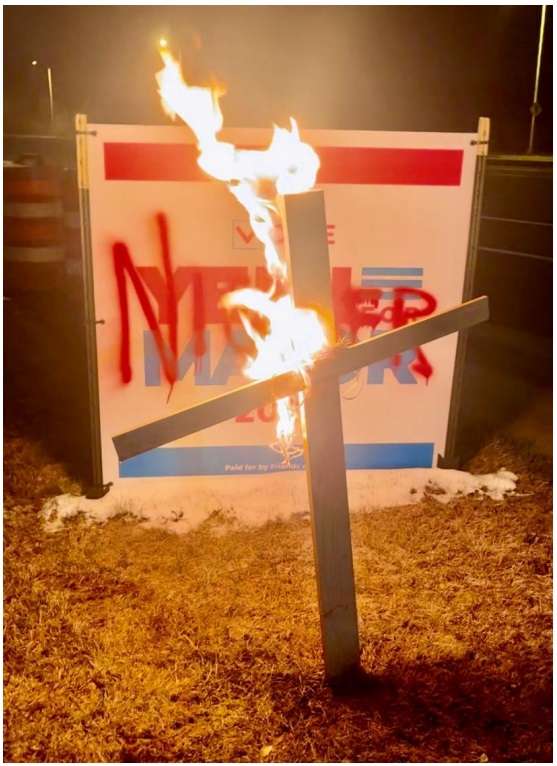

From today’s decision by Judge Regina M. Rodriguez (D. Colo.) in U.S. v. Bernard:
Colorado Springs, Colorado, held an election for mayor …. CANDIDATE 1 [Yemi Mobolade -EV] is black and CANDIDATE 2 [Wayne W. Williams -EV] is white…. Defendants supported CANDIDATE 1. The Indictment alleges that the Defendants devised a plan to help CANDIDATE 1 win the runoff election. In the early morning hours [three weeks before the election], the Defendants defaced a political sign with CANDIDATE 1’s name on it by using red spray paint to write the N-word on it. The Defendants then staged a burning cross in front of the sign and videotaped it.
Later that same day, the Defendants created a fake email account, posing as a concerned citizen, and sent the video, along with an email referring to hate crimes, to media outlets and CANDIDATE 1’s campaign. {The email described what was depicted in the video—”To my surprise and disgust it was a cross on fire in front of running candidate’s sign for Mayor. Looking past the flames I see it’s Yemi Mobalade’s sign with the word sprayed painted across in red ‘NIGGER’!” The email also included language regarding hate-crime tactics used to harass and intimidate candidates and voters in elections.} According to Defendant Bernard, Defendants’ actions were “specifically designed to generate voter outrage and support for a candidate” they actively backed….
Defendants were charged with conspiracy and with “using instrumentalities of interstate commerce to maliciously convey false information to intimidate someone by means of fire in violation of,” and the court rejected defendants’ motion to dismiss the charge:
For the government to succeed on [the intimidation] charge, it must prove that the communication in question was a true threat lying outside of First Amendment protection…. “The ‘true’ in [the term ‘true threat’] distinguishes what is at issue from jests, ‘[political] hyperbole,’ or other statements that when taken in context do not convey a real possibility that violence will follow (say, ‘I am going to kill you for showing up late’).” True threats instead “encompass those statements where the speaker means to communicate a serious expression of an intent to commit an act of unlawful violence to a particular individual or group of individuals.” [A true threat] “subject[s] individuals to ‘fear of violence’ and to the many kinds of ‘disruption that fear engenders.'” … [T]he mens rea required to prove a true threat is recklessness, meaning that “a speaker is aware that others could regard his statements as threatening violence and delivers them anyway.” …
Defendants argue that they did not intend to threaten CANDIDATE 1 but instead intended to support his campaign. Defendant Bernard argues that “the distribution of the video actively disavowed and condemned the cross burning: (1) Expressed outrage at the act; (2) Blamed political opponents; (3) Urged support for Candidate 1; and (4) sought to mobilize voters” and therefore the context of the communication was “political theater.” … [But t]he reference to hate crimes in the email indicates that the Defendants were aware that others who saw the video of the burning cross in front of the defaced political sign would, or should, view it as a threat or intimidation to CANDIDATE 1 and/or his supporters. It’s not clear that others who saw the video understood the context that was intended…. CANDIDATE 1 may testify at trial as to what the Defendants’ communication conveyed to him. A reasonable jury could find that Defendants meant their communication not as “political hyperbole” or “political theater” but rather as statements “convey[ing] a real possibility that violence will follow.”
In sum, the Court finds that this is not a case where the statements made by the Defendants were so clearly protected by the First Amendment that the Court can hold, as a matter of law, that they did not constitute a true threat. Instead, the Court finds that “whether a defendant’s statement is a true threat or mere political speech is a question for the jury.” Considering all of the relevant factors, the Court has little difficulty concluding that a reasonable juror could find that the Defendants’ comments were a true threat….
Bryan David Fields and Candyce C. Cline represent the government.
















